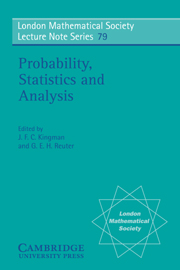Book contents
- Frontmatter
- Contents
- The asymptotic speed and shape of a particle system
- On doubly stochastic population processes
- On limit theorems for occupation times
- The Martin boundary of two dimensional Ornstein-Uhlenbeck processes
- Green's and Dirichlet spaces for a symmetric Markov transition function
- On a theorem of Kabanov, Liptser and Širjaev
- Oxford Commemoration Ball
- Invariant measures and the q-matrix
- The appearance of a multivariate exponential distribution in sojourn times for birth-death and diffusion processes
- Three unsolved problems in discrete Markov theory
- The electrostatic capacity of an ellipsoid
- Stationary one-dimensional Markov random fields with a continuous state space
- A uniform central limit theorem for partial-sum processes indexed by sets
- Multidimensional randomness
- Some properties of a test for multimodality based on kernel density estimates
- Criteria for rates of convergence of Markov chains, with application to queueing and storage theory
- Competition and bottle-necks
- Contributors
Competition and bottle-necks
Published online by Cambridge University Press: 05 April 2013
- Frontmatter
- Contents
- The asymptotic speed and shape of a particle system
- On doubly stochastic population processes
- On limit theorems for occupation times
- The Martin boundary of two dimensional Ornstein-Uhlenbeck processes
- Green's and Dirichlet spaces for a symmetric Markov transition function
- On a theorem of Kabanov, Liptser and Širjaev
- Oxford Commemoration Ball
- Invariant measures and the q-matrix
- The appearance of a multivariate exponential distribution in sojourn times for birth-death and diffusion processes
- Three unsolved problems in discrete Markov theory
- The electrostatic capacity of an ellipsoid
- Stationary one-dimensional Markov random fields with a continuous state space
- A uniform central limit theorem for partial-sum processes indexed by sets
- Multidimensional randomness
- Some properties of a test for multimodality based on kernel density estimates
- Criteria for rates of convergence of Markov chains, with application to queueing and storage theory
- Competition and bottle-necks
- Contributors
Summary
One of the most tattered volumes on my bookshelf is the Symposium on Stochastic Processes, reprinted from the 1949 volume of the Journal of the Royal Statistical Society, Series B. This consists of the three substantial and highly personal survey articles contributed to the symposium by Joseph Moyal, Maurice Bartlett and David Kendall. Together they provided magnificent reading and reference at a time when the stochastic process literature was a meagre scattered one, and continued to do so for many readers over many years. In doing so, they confirmed, if they did not indeed found, the recognisable British tradition in stochastic processes.
David Kendall's article in this volume, “Stochastic processes and population growth”, is only one of many he has written in the course of a distinguished career, and may well not be the one he prizes highest. I single it out, however, both for the seminal effect it had upon me personally, and because it gives an early example of his fascination with the capturing of an applied problem, having both intrinsic interest and an aspect of intangibility, in the meshes of a theory which is light but strong. David's trophies in this benign hunt are legion and living.
Introduction
There have been many models of competition between species, deterministic and stochastic. The most satisfactory of these are those in which the mechanism of competition is made explicit, as competition for limited resources. Deterministic versions of such models lead to the conclusion which O.M. Phillips (1973, 1974) terms the principle of competitive exclusion.
- Type
- Chapter
- Information
- Probability, Statistics and Analysis , pp. 277 - 284Publisher: Cambridge University PressPrint publication year: 1983
- 4
- Cited by



